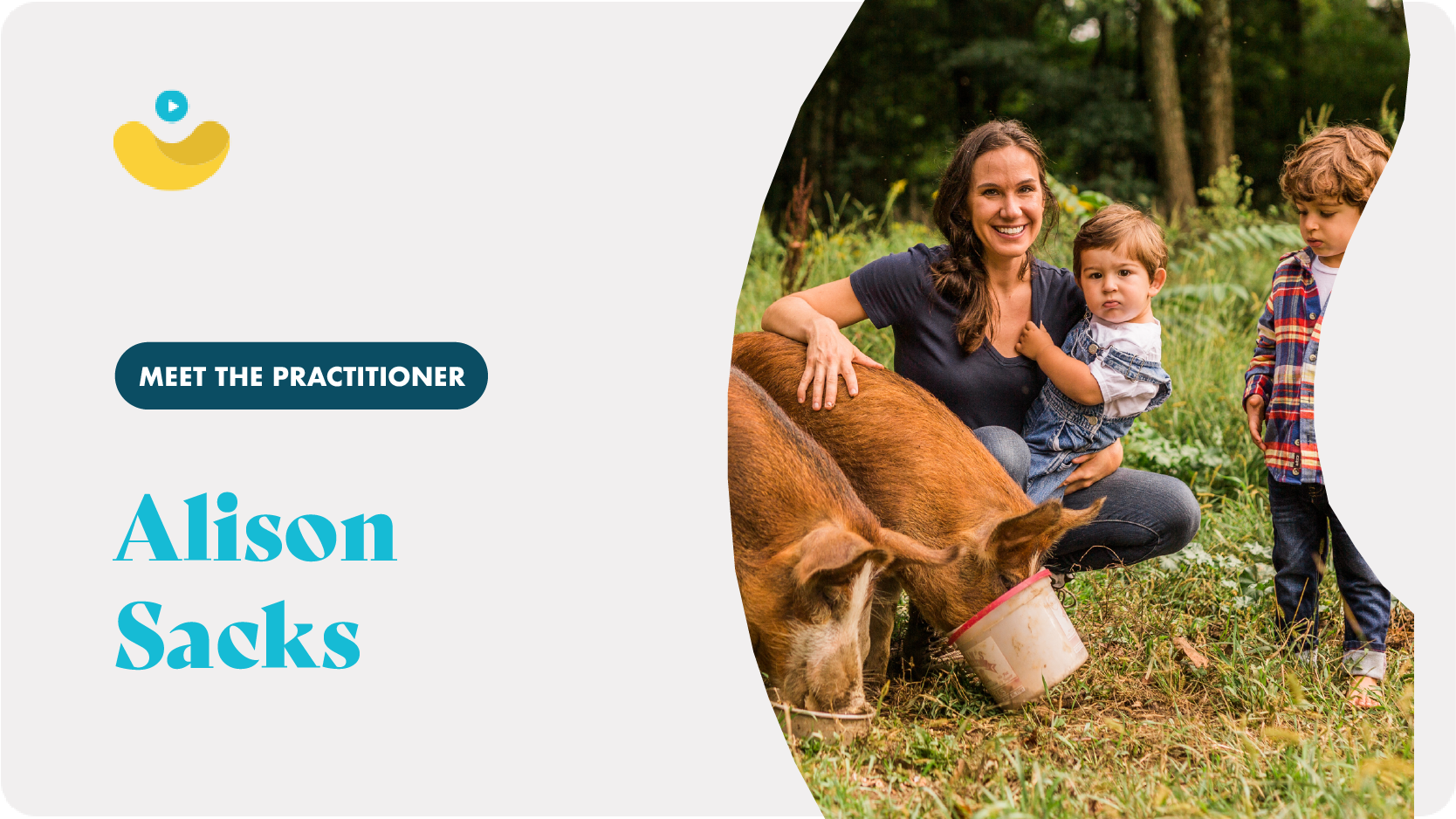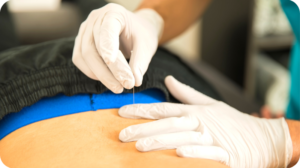Alison Sacks is a licensed and registered dietitian, specializing in helping people achieve a realistic, healthy lifestyle using a balanced, whole-foods approach. She has devoted the past fifteen years to healing and preventing chronic diseases. She specializes in disease management and prevention, digestive health such as food intolerances, and IBS/FODMAP, fertility, disordered eating, and helping people with weight concerns. Alison has worked as an inpatient dietitian specializing in therapeutic nutritional care for the critically ill and people diagnosed with cancer and ALS. She currently helps individual clients struggling with eating disorders regain health, and teaches busy moms, executives, and others how to cook using whole foods. When not working with clients, she is raising her children and helping her husband run their pig farm, Catoctin Mountain Farm, where they raise happy woodland and pastured livestock free of chemicals, hormones, and antibiotics. (Learn more about the farm and their delicious pork products at www.catoctinmountainfarm.com.)

Q. What drew you to nutrition as a profession in the first place?
A. In 2008, I was in college considering what my major should be. I looked at all my upper class friends who were graduating and not using their degrees. I thought, “Well, I’ll be darned. If that happens to me, if I end up doing absolutely nothing with my career, someday I plan on having a family. I want to specialize in knowledge that I can at least apply to my family’s benefit. Truthfully I had no idea … I had never heard of a dietician. It was a brand new world to me. I’ve ended up wearing many different hats over the last fifteen years, but I’ve always had a strong connection to the earth. I’ve always taken the view that foods really can be medicine. I remember breaking down medications into their components, and many of them come from herbs, from a botanical standpoint. That’s always informed my work as a dietitian.
Q. What is the difference between a dietitian and a nutritionist?
A. Dietitians are registered and licensed. We have a graduate degree and have to take a board exam, like a registered nurse. That doesn’t mean that nutritionists aren’t knowledgeable. In fact, they often explore the area outside the box of Westernized medical practice. As a dietitian, though, I can legally walk into a hospital and treat sick people, from a medical standpoint.
Q. What does most of your work consist of right now?
A. I work with really high acuity eating disorders. It’s treating malnutrition, but it’s a different spectrum. My work now requires that I take a step back and ask, “What is the short-term goal, and what is the overall goal?” Eating disorders are a whole different beast. You’re really grappling with a mental illness and the food just happens to be a placeholder. I tend to ask my patients where they want to start and what they want to do with their lives. I meet them where they’re at. I have a client right now who is eating 400 calories, so it’s like, well, this week let’s try for 500. It’s a slow process with many barriers.
Q. What are some of the biggest challenges in using nutrition as a health tool?
A. Getting people to really understand how powerful it can be. It’s educating people to grasp the value behind nutrition, and I think in our culture we don’t. We live in a world where we are almost overnourished. You walk into a grocery store and, bam! There are all these options, all these temptations. But the quality, well…. You look in people’s grocery carts, and they are filled with processed foods. The health versus convenience crisis in this country is much greater than most of us comprehend.
Q. Why do you think that is?
A. I think we have lost the connection with our food and gathering around a table. Most households don’t cook anymore. We don’t care to know where our food comes from or what’s in it. We have a connection to the label, but not the ingredient or farmer behind it. We don’t know who our farmers are anymore. I’ve become much more passionate since being married to a farmer, because we are only two percent of the population. There are so few of us, trying to feed a country. Consequently, food companies end up buying from other countries, and their regulations and oversight are completely different from ours. Buzz words like “organic” and “natural” are misleading.
Q. What about the issue of GMOs?
A. Honestly? There are 10 GMO crops grown in the U.S. If you eat processed foods, it is very likely you are eating foods and food products made with GMO crops. People think that they are in everything—like their vegetables and meats, which is wrong. Most GMO crops are used to make ingredients like soybean oil, corn syrup, sugar, and canola oil. There are some potatoes and apples that are GMO. It’s best to read labels, as some food manufacturers are now disclosing GMOs with a “bioengineered” label.
Q. It seems like nutrition counseling is ideal for remote practice, is that the case?
A. Definitely. Most of the time I don’t need an hour in a room with somebody. What they need is my ongoing support to keep their momentum going. A quick check-in to help inspire that next meal. Or I had a text this evening from a girl who weighs 62 pounds and she was like, “I feel so bloated, I don’t think I can eat today.” I become a cheerleader, friend, big sister. There is no judgement. I let them hold that space and then we move forward. The technology does help empower that connection. People feel comfortable in their homes and often open up sooner. I have a client who is a diabetic. I get an alert listing her blood sugar, every time she scans her skin sensor. So, yes, remote works great for what I do.
Q. You’re a chef. Is teaching people to cook part of what you do?
A. I like to say “if it relates to food, I’m the gal for the job!” Food is my passion and helping people grow their own healthy relationship with food is my mission.
Q. If you could remove one ingredient from today’s American diet, one thing that would make everyone healthier, what would it be?
A. Crappy oils. Bad oils are killing us, not our steaks. Like the canola oil in the salad dressing and all those processed foods. These oils are labeled “heart healthy” so we buy them thinking they are good for us, but we are being completely mislead. These oils are creating a systemic inflammatory response in our systems. Chronic inflammation is, in turn, linked to a vast range of diseases, from fibromyalgia to cancer. Just one more reason to avoid processed foods and know your food.
Q. What does “Heal” mean to you?
A. It involves looking at any sort of fracture in your life in terms of your whole body and overall health. Healing has so many depths and layers. You have a baby and that means taking weeks to “heal.” Something blossoms from that. You have a traumatic accident. The body is broken. You heal from that, sometimes finding new strength. I believe it’s a mind, body, spiritual thing. There is no one right or wrong answer to it. There are medicines, there are prayers, there are potions, and there are so many different modalities to heal. Nutrition is one of those, but it’s not about restrictions, it’s about creating new habits. And, as crucial as it is, it’s one component of a larger picture.
Share some love if you like this post!







